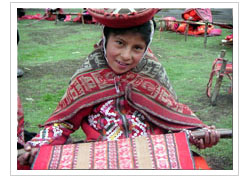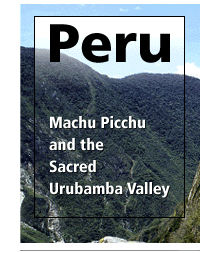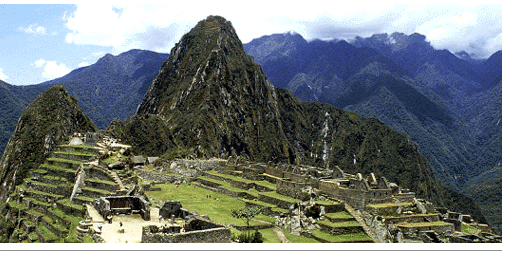|

Peru Cultural Immersion College Credit Program
This program is designed for intact university and college groups from a single department. Please contact us for a detailed syllabus and information on college credit. If you are a professor and interested in bringing a group of your students to Peru with Mountain Spirit Institute please contact MSI's Executive Director Randy Richards .

Our program includes six components:
- Daily activities
- Service Projects
- Group Expeditions
- Solo Experiences
 Daily Activities Daily Activities
These activities are a sample of what is available during your
stay at Ollantaytambo. Each participant will have an opportunity
to work at of the local shops or projects and participate in
the different activities throughout their stay in Ollantaytambo:
- Basketry: For generations the Carbajal family has been weaving
"pispita" stem baskets. Students will be able to
visit the Carbajal family and learn how to make baskets.
- Blacksmith Shop: Students interested in metal work are welcome
to work on a project of their liking.
- Bread Oven: The firewood bread ovens in Ollantaytambo provide
bread for the entire population of Ollantaytambo. Students
can learn how to make bread with the local bread masters.
- Ceramics: The museum ceramics school welcomes anybody interested.
Lucho Soler, the schoolteacher and artist has been working
in Ollantaytambo using pre-Columbian Andean techniques.
- Participants may also visit the local high school. Urubamba
Market. Shopping for weekly supplies is done at the Urubamba
farmer’s produce and meat market. Students on separate
occasions will take the local bus to Urubamba and do weekly
shopping at the market for the items on the shopping list.
- Art and Journaling. Drawing, painting and journaling what
one sees is a vital element of experiential learning, One
can be coached and practice on the basics of Pen and Ink,
watercolor and possibly oils or other mediums, and will also
have time to reflect in your journal.
Quechua and Spanish language Learning. Conversational language
learning in the cultural immersion tradition, allows the participant
to learn by doing, not by translating. You will learn the language
with locals to acquire a better understanding of your Peruvian
surroundings.
 Service Projects and
Town Work Service Projects and
Town Work
- Adobe making, house roofing and field work. River and Inca
Path Cleanup and a Tree Planting Campaign are two service
programs in the area.
- Ollantaytambo has a number of local organizations (listed
below) that could use a hand in different aspects of their
work. Individuals may take time to talk to the leaders of
these organizations and see how they can contribute to their
work.
- CATCCO Museum: This is a locally run cultural organization.
Aside from managing the local museum and information center,
it runs a number of community outreach programs.
- TROTUH (The Restaurant of the Universal Heart): This is
a food shelter for out of town kids who walk for between 1
and 3 hours in order to get to school.
- ECOAN: works in the communities surrounding Ollantaytambo
whose main objective
is to protect the endangered native Polilepis "Qeuña"
forests.
- Inca Porter Project: This organization, which is just getting
started in Ollantaytambo, is working to help porters who work
on the Inca trail to Machu Picchu
improve their working conditions, by helping them negotiate
with travel agencies in the area and offering them training
in basic skills, especially English.
 Group Expedition/Visiting
Important Historical Sites Group Expedition/Visiting
Important Historical Sites
Trek Along a Portion of the Inca Trail to Machu Picchu
Three- to four-day expeditions are part of our program. You
will be hiking at high altitude in the backcountry, along remote
parts of the countryside that most tourists rarely see. As a
team, participants will plan the itinerary, purchase the food,
cooking fuel, other supplies needed, set up tents, and work
together to ensure the expedition’s success.
We will also visit many of the amazing important ruins in the
area. Inca Trail section: Participants will disembark the Machu
Picchu train at Kilometer Marker 104 and hike, with both an
MSI and local guide, on a branch of the Inca Trail to the formidable
complex of Winaywayna. This links up with the Inca Trail to
Machu Picchu. The rest of the day will be devoted to visiting
the famed and stunning ruins of Machu Picchu.
Quechua - Indigenous Elders Speak
You will learn village Elders’ perspectives of their
place in the world and how Inca and Quechua culture relate to
the Pacha Mama or Earth Mother, and may, if you wish, participate
in ceremony and prayer honoring the Pacha Mama and Mountain
Spirits or Apus in the area
Solo Experiences
A 24-hour solo will be part of the expedition, depending on
location and conditions. It’s a time to rest on your own
in a beautiful mountain location, to reflect on what the program
has meant to you and to start thinking about how you will transfer
what you have learned back to your life in the US.
Return to Top of Page

Dexter R. Richards
'Randy' Richards has guided and taught individuals, clients,
and participants throughout South America, the European Alps
and the Western US since 1981. He has been a senior guide for
Alpine Ascents International on Aconcagua, Argentina and four
of Ecuador’s major volcanoes, and expedition co-leader
on Mt. Huascaran, Peru, as well as a respected instructor on
Mt. Baker...read more.
Robert Stremba
Robert Stremba is Vice President of Mountain Spirit Institute,
and Coordinator and Professor of Adventure Education
at Fort Lewis College, Colorado...read
more.
Return to Top of Page

Mountain Spirit suggests that you purchase a few guide books
from our reading list, brush up on your languages, and start studying!
Please contact us for our reading list.
Visit www.cdc.gov
for details.
Health
Your MSI staff on this expedition includes Randy
Richards, an Emergency Medical Technician, to take care
of you while you're with us. Before you leave, however, The
Center for Disease Control CDC recommends the following vaccines;
see your doctor at least 4–6 weeks before your trip to
allow time for immunizations to take effect.
- Hepatitis A or immune globulin (IG).
- Hepatitis B, if you might be exposed to blood (for example,
health-care workers), have sexual contact with the local population,
stay >6 months in the region, or be exposed through medical
treatment.
- Yellow fever vaccination, if you will be traveling outside
urban areas.
- As needed, booster doses for tetanus-diphtheria and measles.
- Anti-malarial drugs are not necessary for this trip (per
MSI).
For more information on CDC recommendations, please visit their
web
site.
Our Peru expedition will include hiking and camping at high
altitudes; for this reason, you should be healthy and fit enough
to endure the hiking/camping portions of our program.
Supplies and Belongings
Come prepared with an open mind, bring a journal, and if you
like to draw or watercolor, this is the program for you. Wendy
Weeks, your host at El Alberque, is an accomplished painter.
As a result, oils, watercolor as well as other mediums could
be as important as your camera, so bring some art materials.
There are people who have traveled for ten years in Peru and
never had anything stolen. There are others who have traveled
for one month and have had things taken from them ten times.
One can very easily take precautions. We recommend reading Lonely
Planet’s instructions about traveling safely.
You can purchase most everything in Cusco that you'll need
(shampoo, razors, socks and t-shirts, etc.), so you may want
to buy some of these items there. Certainly, traveling light
on the plane and buying a sweater in Cusco is a good way to
go. However Gore-tex or similar rainwear is better purchased
in the US. Consider also purchasing a large colorful Peruvian
duffle bag once you are there for taking gifts back to the US.
In short, pack for hiking and camping, as well as relaxing.
For suggestions on what to bring along with you, please contact
us and we'll be happy to help.
 Language Language
We ask that you study the language before you go. A bit of
effort to speak the language goes a long, long way with the
local people. We can’t emphasize this enough. Knowing some
basic Spanish and a few Quechua words will do more than anything
else to put you in closer touch with the people of Peru. Learning
the basics is easier than you might expect. Start with Spanish
tapes or a fun picture book with removable stickers of Spanish
words (which one can put on light switches, night tables, and
toothbrush).
Randy speaks fluent Spanish and basic phrases in Quechua. The
other staff speaks fluent Spanish, as well as Quechua and English.
Some shop owners may speak a little English. If you find yourself
in a bind, you probably won’t have a long wait before someone
comes to your rescue. However, our expectation is that you will
have learned some basic Spanish prior to our expedition, as
a courtesy to your hosts.
Return to Top of Page

Altitude
Taking it slowly the first few days to allow time for your
body to acclimate is the most important rule for adjusting to
altitude. By the time we embark on any significant hiking or
climbing, you will be fairly well adjusted to the altitude.
Your guides and facilitators will use the old program of 'climbing
high and sleeping low' to properly acclimate. Cusco is at 3362
Meters (about 9500 ft.) and higher than Machu Picchu, so one
should plan on taking it a bit easy the first day.
Money, Credit Cards and Debit Cards
Cash advances and debit machines are easily accessed in Cusco
and Lima, however we have found that VISA is much more widely
used than Mastercard. Have a backup card carried in a separate
place. Transfers from Savings to your checking is also possible
in some locations but not all. Traveler’s checks may be
cashed at some locations.
Communications
- PHONE: having a calling card will be useful or better yet,
you can purchase a Peruvian calling card and use it for calling
the US.
- EMAIL: This is the best way to go. There are public computer
booths/stalls where you can log onto the web for approx. $.50/hour.
Having a web-based email such as Yahoo! or Hotmail is free,
so you only pay the hourly rate. It can save a bundle on phone
calls.
- MAIL: Peruvian stamps aren’t the cheapest but are works
for art. Regular mail’s reliability has improved somewhat,
especially for letters, which take about 2-3.5 weeks in delivery
time. Mailing valuables, and any packages for that matter, is
not recommended.
- FAX: easily available, but more expensive than email, in many
shops in town.
- SKYPE INTERNET CALLING: Web-based program available at all internet booths that allows free high quality intenational calling and video calling to and from Internet café computers. Simply create your own account and open it on any computer to start calling other Skype users or regular telephones for about .02 cents per minute
Return to Top of Page

20-day Peru Expedition is $2800.00
International and in-Peru air travel is not included.
(US and in-Peru air costs are estimated at Estimate$630.00, based
on rates provided 1/25/05 for roundtrip airfare for BOS/LIMA/BOS
and LIMA/CUSCO/LIMA).
This sum is included as courtesy but will vary.
INCLUDED
- Ground Transportation
- Three Daily Meals*
- Hotel Accommodations in Cusco
- Accommodations and Services at the El Albergue Hostel in Ollantaytambo
- Camping Expenses
- Activities and Workshops
- Entrance Fees for Ruins and Museums
- Roundtrip Train to Machu Picchu from El Albergue
- Km 104 Inca Train and Machu Picchu Expedition with Professional
Guides
- Hotel Accommodations in Machu Picchu
- Co-Leader Fees and Administrative Costs
*NOT included are five meals in Cusco and towns (with an average
cost of $3-4 per meal), which allow participants freedom to explore
a number of restaurants on their own.
NOT INCLUDED
- International and In-country air transportation
- Compensation for consequences of flight delays or Acts of
God
- Tips and gratuities
- Snacks and sodas or any alcohol
- Donations to community project that the group or individuals
might want to support
- Immunizations, medical costs or health insurance, (which includes
an international medical evacuation)
- Peru airport taxes ($35.00-$38.00 total)
Return to Top of Page

College credit is available through Fort Lewis College, Durango Colorado. Three Credits will be awarded through FLC and arrangements
must be made during the application process. Please contact the
MSI office for a syllabus and how to proceed.
Mountain Spirit Institute’s main program staff, Randy Richards,
has been guiding in the Alps, America’s western mountains
and the Andes for 25 years and Mountain Spirit Institute has been
operating programs for five years.
Mountain Spirit Institute is a fully insured and federally recognized
510 (c) 3 Non-Profit Educational Organization.To receive information
on optional college credit please contact
us.
Return to Top of Page
PHOTO CREDIT: Top and Bottom Image by Joaquin
Randall. |







